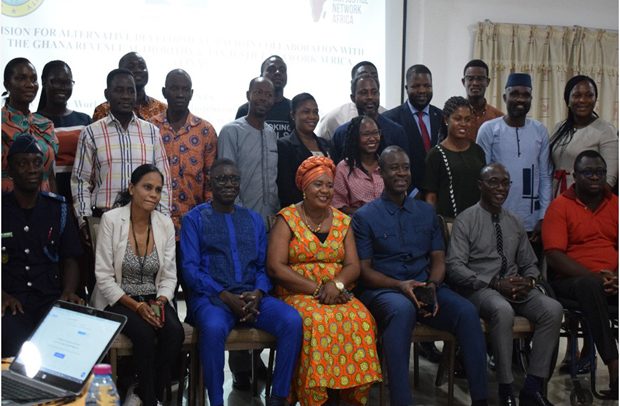The stakeholders in a group after the workshop
CIVIL SOCIETY Organisations (CSOs)and government institutions have met in Accra to deliberate on tobacco taxation/control and illicit trade in tobacco products in the country.
The day’s meeting organised by the Vision for Alternative Development (VALD) in collaboration with the Ghana Revenue Authority (GRA) and Tax Justice Network Africa (TJNA), was attended by some Members of Parliament and representatives from the Food and Drugs Authority (FDA), the Kwame Nkrumah University of Science and Technology, the Ministry of Healthand also the Ministry of Finance.
Member of Parliament for Wa East and member of the Parliamentary Select Committee on Food, Agriculture and Cocoa Affairs, Dr. Godfred Seidu Jasaw, called on CSOs to provide strong evidence for the change in the tobacco tax structure.
“This will assist the Ghana Revenue Authority to put the evidence together and submit it to the Ministry of Finance to be presented to Parliament to be passed into law for enforcement,” he said.
Dr. Olivia Boateng, Head, Tobacco and Substances of Abuse and World Health Organisation (WHO) Framework Convention on Tobacco Control (FCTC) focal person of the FDA, said tobacco is mostly used among low-income population.
Dr. Boateng said the implementation of a mixed strategy of ad-valorem and specific tax was proposed by stakeholders to control the affordability and accessibility while increasing government revenue.
She said under this hybrid system, the current import excise tax of 175 per cent ad-valorem should be maintained plus the introduction of a specific tax component of 20 cigarettes per pack with an option to adjust to cater for inflation.
Assistance Deputy Commissioner Strategy, Research Policy and Programmes GRA,Dr. Alex Moyem Kombat, said GRA has stationed preventive officers along several border posts to check illegal entry of tobacco products.
Policy, Research and Advocacy Officer of TJNA, Rodgers Kidiya, said higher tobacco taxes would significantly reduce consumption and increase government revenue adding that the counter arguments about the negative economic impact of the tobacco industry were false and greatly overstated.
BY Jamila Akweley Okertchiri

